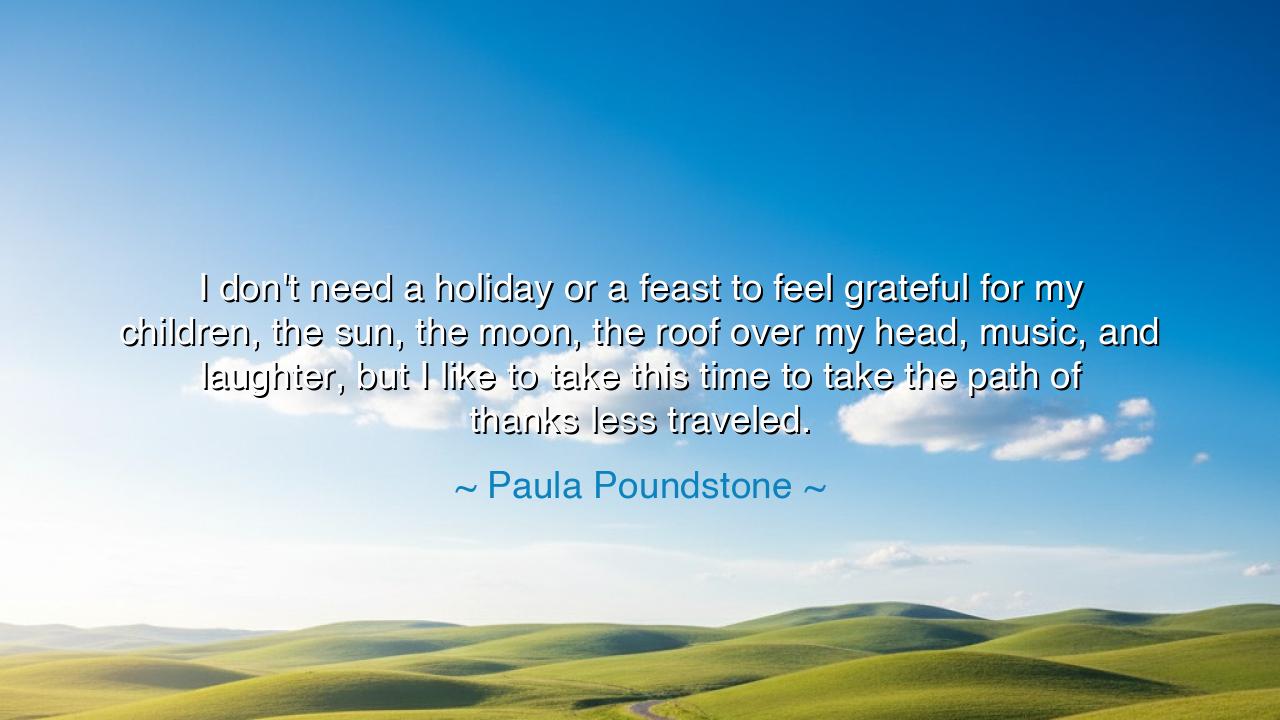
I don't need a holiday or a feast to feel grateful for my
I don't need a holiday or a feast to feel grateful for my children, the sun, the moon, the roof over my head, music, and laughter, but I like to take this time to take the path of thanks less traveled.






The words of Paula Poundstone, “I don’t need a holiday or a feast to feel grateful for my children, the sun, the moon, the roof over my head, music, and laughter, but I like to take this time to take the path of thanks less traveled,” are a hymn of everyday reverence, a reminder that gratitude need not wait for ceremony or calendar. In her voice we hear the timeless truth that life’s greatest blessings are often the simplest ones, already present in abundance: family, shelter, the beauty of nature, the gift of art, and the joy of laughter. Her declaration echoes the wisdom of the ancients, who taught that true wealth lies not in possessions but in appreciation.
To say “I don’t need a holiday or a feast” is to reject the notion that gratitude must be confined to rituals or rare occasions. The ancients warned against such forgetfulness. The Stoics counseled their students to meditate daily upon what they had, lest they become blind to their blessings. The Psalms rang with songs of thanksgiving, not tied to harvests or festivals alone, but to every dawn and every breath. Poundstone’s words, though spoken in our age, draw upon this ancient current: gratitude is not an event but a way of living.
Her list of blessings — children, the sun, the moon, the roof, music, laughter — carries the tone of elemental poetry. These are not luxuries, but essentials of the human spirit. Children embody the continuity of life. The sun and moon mark the rhythm of our days and nights. A roof over one’s head is shelter from storm. Music lifts the heart beyond words, and laughter binds us together with joy. These things, easily overlooked, are in truth treasures beyond price. By naming them, Poundstone calls us back to the art of seeing the ordinary as sacred.
The heart of her statement lies in the phrase “the path of thanks less traveled.” For many give thanks on the obvious occasions — at feasts, on holidays, in times of prosperity. But fewer walk the path of daily thanksgiving, of noticing beauty in the overlooked, of rejoicing in the common. History gives us examples of those who found this path. Consider Anne Frank, who in the midst of terror and hiding, still wrote of her gratitude for the beauty of nature glimpsed from her window, and the hope it gave her spirit. She walked the path less traveled, giving thanks not in ease, but in hardship, showing that gratitude is not bound by circumstance.
There is also here a teaching about awareness. Gratitude begins not with abundance, but with attention. Those who look only for grand blessings may wait long, but those who see the small and constant gifts — the warmth of sunlight, the sound of laughter, the roof above them — are never empty. The ancients taught that happiness is not in gaining more, but in seeing more clearly what is already yours. Thus, the path of gratitude is indeed “less traveled,” for many rush past life’s quiet miracles, blind in their pursuit of greater things.
The lesson for us is plain: let us not wait for feast days to give thanks. Let us not confine gratitude to moments when abundance overwhelms us. Instead, let gratitude become a daily path, a rhythm of life, a way of seeing. Let us give thanks for small joys, for ordinary moments, for the simple fact of being alive. In doing so, our lives will be enriched, not by what we gain, but by what we recognize.
As practical action, begin with a daily practice: each day, speak aloud or write down three things for which you are thankful, however small. Notice the sunlight, the laughter of friends, the shelter you live in. Share your gratitude with others — thank them directly, and let your words become blessings. And when holidays come, take them not only as days of ritual, but as reminders of the gratitude you already carry. In this way, you too will walk the path of thanks less traveled.
Thus, Paula Poundstone’s words become more than a reflection of personal gratitude — they stand as a teaching for all generations: do not wait for special days to be grateful; walk daily in thanksgiving, and the ordinary will become extraordinary. This is the path that few travel, but those who do find peace, joy, and abundance in every breath.






AAdministratorAdministrator
Welcome, honored guests. Please leave a comment, we will respond soon